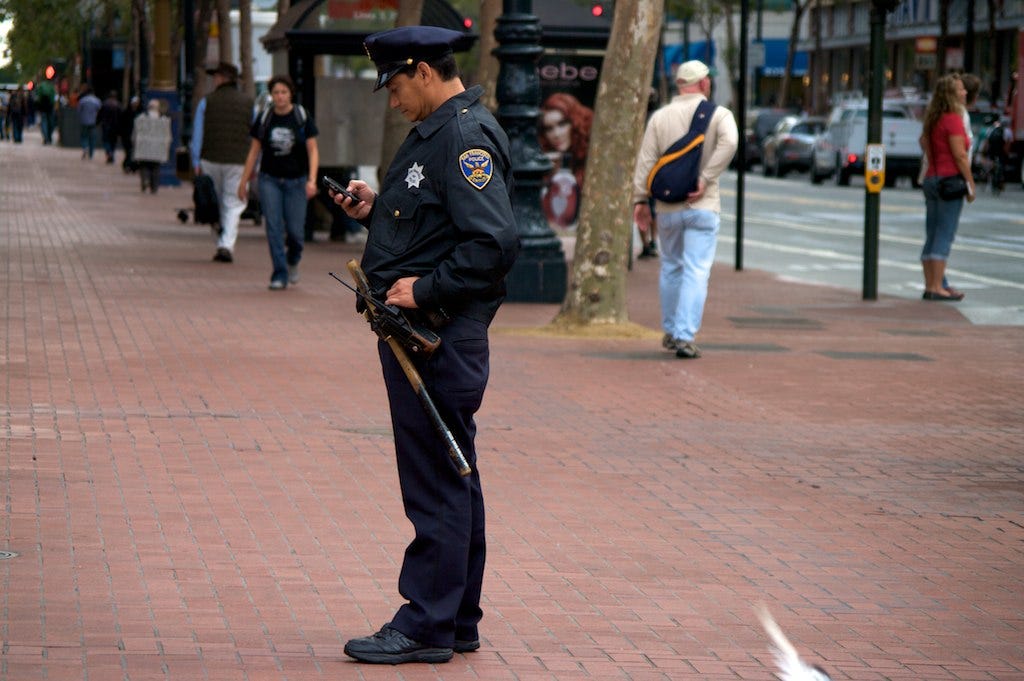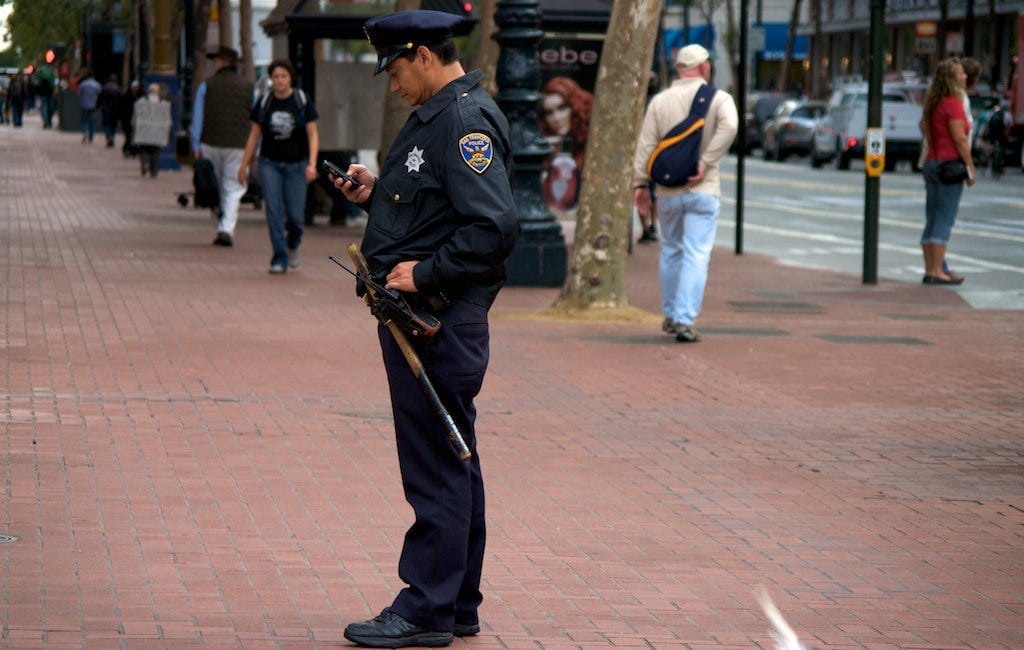
When the workday ends and San Franciscans leave the city’s gleaming buildings, with their modern art and digital waterfalls, they walk into a different world on the streets: one with needles, scraps of cardboard and people asking for money for their next meal. Often, these scenes make us deeply uncomfortable — so much so that we wonder what we should do about it, if anything at all.
Imagine this scenario: you see a man outside, his sleeping bag up against the outside wall of your building, talking loudly to himself. This is a pretty ordinary situation all over the city, so some people may hardly notice him. But others may feel scared and wonder, Is he on drugs? Is he mentally stable? Does he need help?
In this case, a surprising number of people would choose to call police. That point is proven by cold, hard numbers: in 2016, the SF Police Department made 57,249 dispatches for calls relating to homelessness.
But here’s the unfortunate reality: calling 911 — or even 311, the number that the city touts as the alternative for requesting services for individuals in need — can result in devastating consequences. In 2016 (according to the latest available data), law-enforcement interactions with the homeless population resulted in 125 arrests and 4,711 citations.
That means that if you make the call in hopes of helping someone, you’ll likely make their situation only worse and trigger a vicious cycle of law enforcement, displacement and even property destruction, which can just cause more trauma.
911 is for emergencies, not uncomfortable situations
Of course, there are times to call the police when someone is in immediate danger. But experts say 911 should be reserved for emergencies. And if only medical assistance is necessary, callers should specify that they are asking for medical responders so that police aren’t dispatched.
“Never call the police just because someone is poor and in a public space,” said Dilara Yarbrough, assistant professor of criminal justice studies at San Francisco State University. Doing so, she says, has the potential to cause serious harm, from arrest to the use of deadly physical force.
The mere presence of police officers can escalate situations and increase anxiety in someone, especially if they are suffering from mental illness, said Kelley Cutler, a human-rights organizer with the San Francisco Coalition on Homelessness.
Nationwide, engagement with police carries disproportionate risks for the mentally ill, people of color and homeless people. Nationwide, almost a quarter of those people killed by police were mentally ill, and minorities made up 62.7 percent of unarmed victims of police killings.
In 2016, the US Department of Justice criticized the SFPD for “implicit and institutionalized bias against minority groups,” finding that the department’s officers stopped African Americans at a disproportionately high rate and failed to properly investigate when force was used.
Consider the 2016 case of Luis Góngora. Two city workers called 911 on Góngora, a man who had lived on the streets since being evicted from his apartment in 2012. He was fatally shot by police within just 30 seconds of their arrival at the encampment where he lived. The SFPD responders claimed that Góngora was charging at them, but some eyewitnesses at the event have challenged that account.
If not 911, what about 311?
In recent years, many people have advocated for calling 311, the number the city touts as a one-stop shop for citizens to call to air their complaints and solicit assistance. If calling 911 evokes images of sirens and police officers, surely 311 is all social workers and shelter beds? The truth is a lot more complicated.
The city launched the Healthy Streets Operation Center (HSOC) in early 2018 as a central command center to coordinate responses to homelessness between multiple agencies, including the Department of Homelessness, the Department of Public Works, the Department of Public Health and the police. Now calls to both 311 and 911 related to homelessness get directed to HSOC. A spokesperson for the center said in a recent public meeting that HSOC is responding to 2,000–2,500 requests for service per week.
The idea behind 311 is to address non-emergency situations so that 911 dispatchers’ time can be saved for those who need first responders. But sadly and little known to most, when a call about a homeless individual gets routed to HSOC, the response is often to send police anyway due to a lack of resources, shelters and health workers, said Chris Herring, a UC Berkeley sociology PhD candidate. Herring has been researching this issue in depth, from living on the streets for three months to joining police officers on ride-alongs to reviewing data from 911 and 311 calls.
The risk of police involvement
When officers arrive, they often issue “move-along orders” or citations. Cutler said SF police are handing out tickets for illegal lodging “like candy.” In 2016, the SFPD filed 337 such reports, issuing 282 tickets.
The effect of getting ticketed can be instant and destructive. If individuals don’t pay (often because they can’t afford to do so), they can be subject to a bench warrant, which is issued by a judge when someone fails to show up in court. That then makes them ineligible for a shelter bed, even if they’ve been on a shelter waitlist for a long time—thereby creating a vicious cycle.
“They end up in this very expensive cycle of engaging with the criminal justice system for the so-called ‘crime of poverty’—of having no house. I’m not sure who that serves,” said University of San Francisco’s Rachel Brahinsky, who directs USF’s program in Urban and Public Affairs.
Homeless people can, however, get a reprieve from the justice system if judges intervene on a one-off basis. Sometimes they do so en masse. In 2016, San Francisco’s chief judge threw out over 66,000 bench warrants for quality-of-life violations that had accrued over five years. Additionally, homeless individuals facing charges can seek help on a pro bono basis from defense lawyers through organizations like the Lawyers’ Committee for Civil Rights.
Even if misdemeanor charges ultimately get dismissed by the courts, just the interaction with police and resulting displacement can have disastrous effects, said Brahinsky. People often try to live in or near their old neighborhoods. Knowing the names of streets, others who live near you and where you might be able to get food or safely use a restroom are all advantages of consistently returning to the same place.
Yarbrough has also found that people are more vulnerable to violence in unfamiliar locations. In some cases, women have reported that they’ve experienced sexual assault immediately following a move.
“Not only does this kind of complaint-driven enforcement of anti-homeless laws not achieve the complainer’s goal of moving people out of public space, but also it does a lot of harm to people who are deprived of housing by disrupting their lives, disrupting their support networks and exposing them to even more harm,” she said.
Another effect of police involvement is loss of property. After ordering someone to leave an area and take only what they can carry, officials from the Department of Public Works and police officers can label the left-behind property “abandoned trash,” confiscate it and destroy it.
Herring describes this destruction of property as “a form of criminalization that doesn’t involve citation or arrest,” pointing to people he knew who had lost expensive life-saving medications, treasured family keepsakes and the last few belongings they had managed to hold onto. One woman lost her daughter’s Purple Heart.
What you *can* do
It’s clear that people’s well-intentioned desires to call a number to make problems magically go away can cause more harm than good on the city streets. The harsh reality is that the solution to homelessness is not a phone call, a police sweep or a shiny new app; it’s housing that people can afford.
So actually helping means getting involved more deeply, not just dialing a three-digit phone number. There’s plenty you can do, like help someone fulfill basic needs and advocate politically for issues like Proposition C on November’s ballot, which would tax super-rich businesses to pay for housing for the homeless.
When there is a crisis in front of you — and you determine someone is in need of immediate help — you can also consider contacting service providers who are not going to send police. Yarbrough suggests resources like the Dore Urgent Care Clinic, the Department of Public Health’s Homeless Outreach Team or, for psychiatric crisis interventions, the Mobile Crisis Team.
Aside from these groups, Herring says, “There is nothing for San Franciscan citizens to do through their government except to reach out individually with this person and see what their needs are and see what you as a human being might be able to provide to another human being.”
Local experts suggest saving the following numbers in your phone in case you need to use them in the future:
- Dore Urgent Care Clinic: (415) 553-3100
- SF Department of Public Health’s Homeless Outreach Team: 415-355-7401
- Mobile Crisis Treatment Team: 415-970-4000
Hey! The Bold Italic recently launched a podcast, This Is Your Life in Silicon Valley. Check out the full season or listen to the episode below featuring Alexia Tsotsis, former coeditor of TechCrunch. More coming soon, so stay tuned!







